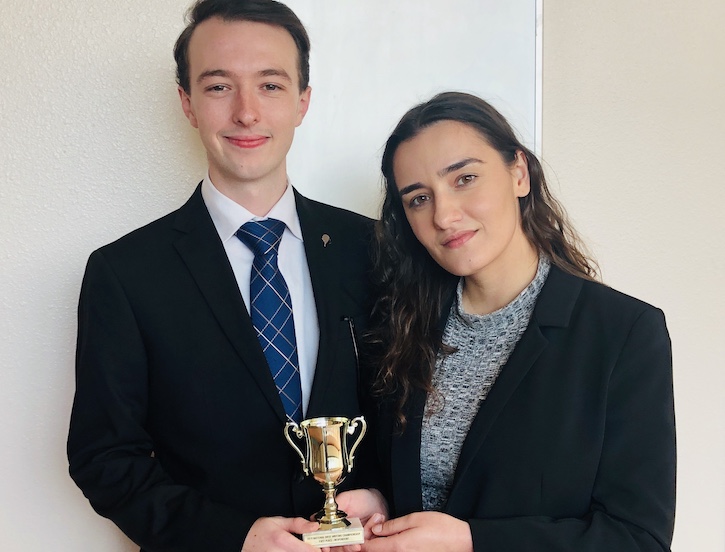SF State's Moot Court Team won the American Moot Court Association (AMCA) National Title for best written brief

Recently, the team of Yana Gagloeva and Liam Sidebottom won the American Moot Court Association (AMCA) National Title for best written brief.
Each year, AMCA sponsor's a national tournament that is comprised of two components: an oral advocacy component and a written brief component. For the written brief portion, students compete for the best written brief for both the "Petitioner" (the party who has filed an appeal to the U.S. Supreme Court) and the "Respondent" (the party who is responding against an appeal to the U.S. Supreme Court). Students choose which side they wish to brief.
For the 2018-2019 season, Yana and Liam were awarded the best brief award in the written component of the competition for the Respondent. Notably, Yana and Liam had the highest score of any brief (either Petitioner or Respondent) in the entire competition, thus constituting their victory as a true "National Champion." This result is quite impressive as written briefs were submitted by teams across the United States from many highly-ranked schools, both for their moot court program, as well as highly-ranked as universities/colleges in general (including, for instance, the University of Chicago). That SFSU can now claim the top spot for written legal advocacy is a testament to our students' success. Additionally, the SF State team of Abigail Richards and Devon Montes also received the #8-ranked Petitioner Brief, meaning two SFSU teams finished in the top-10 on their respective argument "sides."
The fact that SF State has won the written brief national title is truly impressive, especially given the importance of writing in legal analysis. Much of the first year in law school is structure on how to "write like a lawyer," typically in a course colloquially referred to as "Legal Research and Writing." Moreover, the ability to cogently present legal arguments in written form is much of what a lawyer actually does. And, many appellate judges will tell you in moments of earnestness that much of their decision-making centers on the persuasiveness of arguments presented in written legal briefs. Simply put, the ability to present persuasive arguments in writing is the lynchpin of what a lawyer actually does in real life. The fact that SF State students have been trained on how to do so, and, that they excel at doing so on the national level is something we can all be proud of here at SF State.